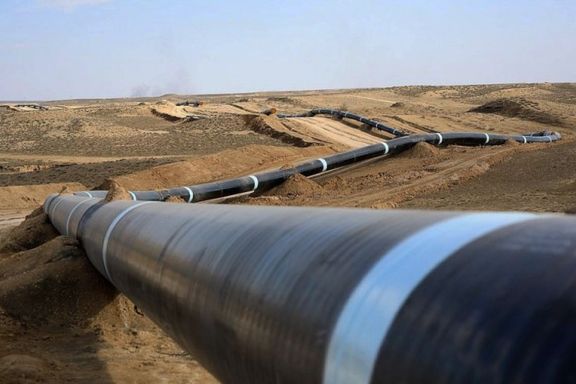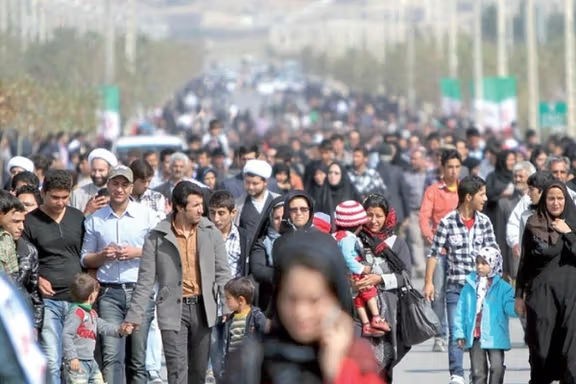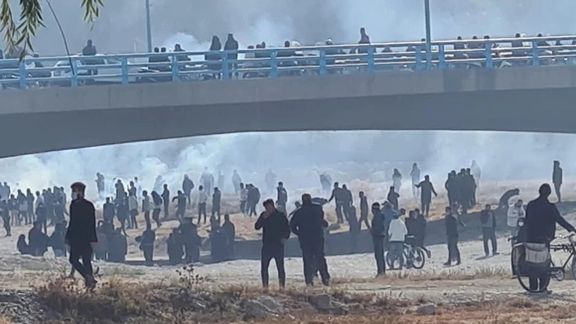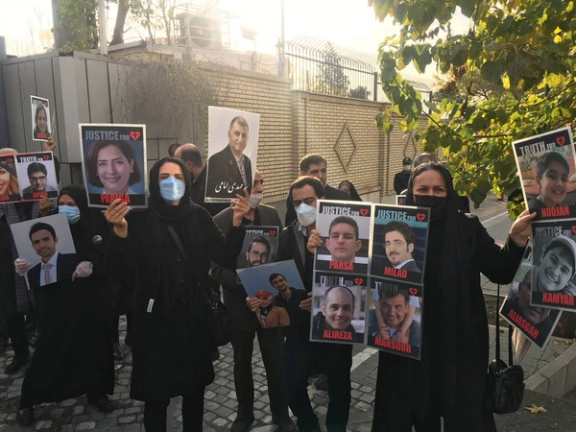Iran, Azerbaijan And Turkmenistan Announce Gas Swap Deal

Iran, Turkmenistan and Azerbaijan have signed a gas swap deal for up to 2 billion cubic meters per year, Iranian state news agency IRNA reported on Sunday.

Iran, Turkmenistan and Azerbaijan have signed a gas swap deal for up to 2 billion cubic meters per year, Iranian state news agency IRNA reported on Sunday.
Under the swap deal, Iran will receive gas from Turkmenistan and deliver an equivalent amount to Azerbaijan at the Astara border, Iranian Oil Minister Javad Owji told state TV.
"Turkmenistan will sell 5-6 million cubic meters of gas per day to Azerbaijan under the trilateral agreement signed ...in Turkmenistan," IRNA said.
Owji also said Iran was moving to resolve a lingering gas debt dispute with Central Asia's Turkmenistan, which said in late 2017 that it was owed $1.8 billion in payments for gas delivered to Tehran.
"We will soon pay the first instalment to clear the gas debt that we owe to the Turkmen side, after talks that were held earlier," Owji said, without giving the amount of the debt.
Iran has major natural gas fields in the south but has imported gas from Turkmenistan since 1997 for distribution in its northern provinces, especially during the winter.
Iran’s gas production is gradually declining due to lack of new investments and technology needed. There have been serious gas shortages in the past two years, leading to power cuts.
Reporting by Reuters

Both far-right and far-left politicians in Iran are proposing new cash handouts to poverty-stricken citizens amid skyrocketing food prices many cannot afford.
Hardline politician Saeed Jalili who once led Iran's nuclear negotiators under former president Mahmoud Ahmadinejad is a far-right politician entertaining the idea. He was the ultraconservative Paydari Party's candidate for Presidency in 2013, set up workgroups within the frameworks of a shadow government when he lost the presidential election to former President Hassan Rouhani.
Although Rouhani never paid any attention to what Jalili and his hardline faction were up to, Jalili continued his work throughout the eight years of Rouhani's presidency and some Iranian media maintain that what President Ebrahim Raisi presented as his plans were the research papers compiled by Jalili's shadow government.
According to lawmaker Ali Khezrian, a member of the parliament presidium, Jalili has been recently holding meetings with members of the Iranian parliament discussing issues including policymaking and combating financial corruption.
Meanwhile, IRGC-linked news agency Tasnim also reported that at one of those meetings, Jalili suggested that with lack of financial resources, the Raisi administration should reclaim foreign currencies put at the disposal of businesses at the preferential rate of 42,000 rials per dollar if those businesses have violated regulations. He also suggested that the foreign currency taken back in this way should be divided among the people.
The cheap dollars for businesses importing food and medicine amid US sanctions is meant to be a subsidy, but it has not helped to keep prices low. There are serious allegations that some individuals and companies have received the cheap currency and imported luxury goods.
One of the ideas put forward by Jalili is "the ideal food basket for Iranians," which is another name for subsidizing foodstuff for low-income Iranians. The idea includes using cell phones and smart cards and linking them with a cash subsidy outlet that would channel funds directly to low-income individuals to buy food.
Food prices have soared by more than 60 percent compared to last year and have left at least one-third of the population struggling to have enough basic food. Meat, fruit and dairy consumption has declined as millions of people cannot afford the high prices.
Jalili's idea of helping the financially hard-hit low-income Iranians is very similar to the ideas of Behzad Nabavi, a far-left politician who heads the umbrella organization of Iran's reform parties.
When Nabavi first introduced the idea, he said he is not shy about returning to the coupon system he had introduced for essential commodities during the eight-year-long war with Iraq in the 1980s. He believes it is essential to provide the key commodities at low cost for the less privileged people. When he first introduced the coupons in the 1980s, Iran's conservatives accused him of being a communist. He says, he does not mind if the same label is used to characterize him once again.

Hardline media in Iran claim that the United States instigated protests in Esfahan to put pressure on Tehran ahead of nuclear talks set to resume on Monday.
Ultra-hardliner Kayhan daily, financed by Supreme Leader Ali Khamenei Sunday claimed, "America's foot soldiers" perverted farmers’ water protest in Esfahan on Friday to "sow unrest and reap sanctions" ahead of Vienna nuclear Talks.
The newspaper claimed in a commentary that Western powers always incite unrest in Iran to "impair the resilience" of the regime and the people against US sanctions to force the regime to return to negotiate over its nuclear program.”
Farmers had been protesting in Esfahan city center for two weeks demanding their traditional water rights from the Zayabdeh Roud river, which has been mostly dry in the past decade. The call to protest on Friday came after security forces stormed the farmers' makeshift camp in the dry riverbed in the early hours of Thursday and burned their tents. Social media reports said they were given fifteen minutes by security forces to leave their tents before they went up in flames.
As people gathered on Friday to continue the protest, Security forces used tear gas, batons and pellet shots to disperse protesters whose slogans grew more and more anti-governmentlater in the day with many chanting slogans against Supreme Leader Ali Khamenei, clerical rule, and security forces.
Kayhan claimed that farmers were not involved in the Friday protests, which it said were hijacked by "paid thugs". Farmers had ended their protest on Wednesday and stayed away from the Friday protests, Kayhan claimed.
The newspaper is ardently opposed to negotiations with the West over Iran's nuclear program. In another commentary Sunday, the newspaper's chief editor, Hossein Shariatmadari, opposed any direct talks with US representatives in Vienna on Monday and said to avenge the blood of Iran's assassinated nuclear scientists including Mohsen Fakhrizadeh a year ago, Iran's envoys in the talks should continue to 'humiliate the US" by refusing direct talks.
The Revolutionary Guards (IRGC)-affiliated Fars news agency also claimed that farmers were not involved in the Friday protests. "It appears that ahead of the new round of talks for lifting sanctions, [US] democrats have once again resorted to their usual policy of "riot inside [Iran] and sanctions from outside to weaken Iran's position," Fars wrote.
The conservative Jomhouri Eslami newspaper in a commentary Sunday criticized the hardline media and called their claims a "distortion of truths". "Cracking down on people and then resorting to propaganda to distort the truth will not only fail to convince the public. It will damage people's trust in authorities and in the propaganda apparatus," it wrote.
"Deeply concerned about the violent crackdown against peaceful protestors in Isfahan. The people of Iran have a right to voice their frustrations and hold their government accountable," US State Department Spokesman Ned Price tweeted Saturday.
Videos posted on social media Friday showed thousands of protesters in the city's dry riverbed and its adjacent boulevards chanting slogans peacefully and refusing to leave despite heavy use of tear gas, firing guns in the air and paramilitary and plainclothes motorcyclists driving into crowds. As the day grew, however, reports said security forces heavy-handedly suppressed the demonstrations that had spread to nearby boulevards. Some protesters threw stones at anti-riot forces.
Iranian authorities invariably blame "thugs and hooligans" for any antigovernment protest. "It was the police who did this, don't go and claim later that they were thugs and hooligans," a wounded old man, apparently one of the farmers said in one of the videos from Esfahan protests.

Iran’s health minister has warned about the possibility of the new coronavirus variant, Omicron, spreading in the country but did not announce any travel bans.
Bahram Einollahi told local media that “despite all precautions” the spread of the new strain is a possibility, and the government will closely monitor the situation. He visited Tehran’s international airport on Saturday to review screening procedures.
Iran was the second country after China in early 2020 where the coronavirus spread and became an epidemic. There have been more than 6 million cases and 130,000 deaths according to official figures, disputed by critics who say the death toll could be twice higher than what the government says.
A slow start to vaccination led to tens of thousands of more deaths from June to September in Iran but the fifth wave of the pandemic, as it was called, has slowed down in recent weeks.
Iran’s embassy in South Africa has warned citizens living in six African countries to be vigilant about protecting themselves against the coronavirus. These countries are South Africa, Zimbabwe, Namibia, Botswana, Lesotho and Eswatini. A health official in Iran also warned citizens from travelling to these countries.

Victims’ families of an airliner downed by Iran in 2020 protested Sunday rejecting a trial of junior officers and demanding top officials to be held to account.
Holding pictures of their loved ones who died in the incident calling the trial a sham and “illegal”, demanding the prosecution of those in command and not low-ranking officers.
The protesters also chanted slogans against the Revolutionary Guard and Supreme Leader Ali Khamenei, while surrounded by a heavy presence of security forces.
Some of the victims’ families say that the downing of a Ukrainian flight from Tehran to Kiev after takeoff by two IRGC missiles was a premeditated act amid military tensions with the United States.
The plane with 176 passengers and crew was targeted on January 8, 2020, hours after Iran fired ballistic missiles at US bases in Iraq and was on alert for a possible retaliation. But authorities did not close the civilian airspace and tried to deny they had shot down the passenger plane.
Victims' families and critics say those on trial are not responsible for decisions taken at a higher level on the night of the incident. They say Amir-Ali Hajizadeh, the Revolutionary Guards aerospace commander was responsible because he did not “clear the airspace.”

State-controlled media in Iran have tried to explain why IRGC General Seyyed Javad Ghaffari, top commander in Syria had to leave that country in early November.
Etemad Online quoted the IRGC-linked news agency Tasnim as having reported that Ghaffari was seen off in Damascus after leading those forces for six years "following some developments in Syria," but did not elaborate on those developments. However, Tasnim acknowledged that according to "foreign news sources," Ghaffari was forced by the Syrian government to leave Syria after a visit to Damascus by the Foreign Minister of the United Arab Emirates, Sheikh Abdullah bin Zayed Al Nahyan's on November 9.
While Tehran has been portraying the development as an ordinary event, The Times of Israel on November 11 quoted Saudi sources as saying that Ghaffari was expelled from Syria as he was "accused of ‘major breach of Syrian sovereignty’ after attacking US forces, and deploying Iranian weapons to unapproved places."
According to the Times, It was reportedly Syria that shunned Iran's Qods Force Commander Javad Ghaffari for "nearly starting a war with Israel," and "almost causing an unwanted regional war."
The report published by the Times of Israel said that acting “contrary to instructions,” Ghafari led “a number of activities against the United States and Israel that almost led to the entry of Syria into an unwanted regional war, including the attack on American targets in Syria on October 20 by Iranian-backed militias.” The report said the move against Ghafari was taken by high-ranking officials in the Assad regime, after “months of disputes.”
Meanwhile, the Jerusalem Post reported that Syrian President Bashar al-Assad was behind the ousting of the top commander of the Iranian forces in Syria. The Post named Al-Arabiya news agency as its source for the report. The Jerusalem Post added that sources at the Syrian Presidential Palace had said that the palace deemed Ghaffari's behavior as a "violation of Syrian sovereignty."
Ghaffari was the third commander of the Iranian forces in Syria since 2011 when Iran began to intervene in Syria's civil war. He started his career in Syria as one of the commanders at the Iranian forces' headquarters in Damascus and later became the commander of the forces in Aleppo where he recently led Iranian forces as well as their Lebanese Hezbollah and Afghan mercenaries, the Fatemiyoun, Etemad Online reported in Tehran.
In an apparent attempt to undermine the news about Ghaffari’s expulsion, political commentator Massoud Assadollahi claimed in an interview with Etemad Online that Iran's presence in Syria has been more political than military in recent months. He also claimed that Ghaffari's mission to Syria had ended in 2020 but the killing of Qods Force Commander Qasem Soleimani delayed his return to Iran.
Meanwhile, Assadollahi characterized Ghaffari as a military adviser. This comes while during his mission to Aleppo, Ghaffari was nicknamed "the butcher of Aleppo," a title utterly far from being advisory. The commentator claimed that Ghaffari's role in Syria was one of "solving the Syrian people's problems," and that he was "a popular figure" in Aleppo.
Assadollahi further denied that Ghaffari was expelled from Syria, adding that according to diplomatic protocols he would have been given 48 hours to leave Syria if he was expelled, but he stayed in Syria for a month after the end of his mission. Some reports said that Ghaffari had his own private business in Syria.
According to the Jerusalem Post, the Saudi news channel Al-Hadath reported that the Syrians blamed the Iranians for taking advantage of Syria's natural and economic resources for their own gain and for evading tax payments to the Syrian regime.
Furthermore, Al-Hadath also revealed that Ghaffari admitted that he had stationed Iranian forces in places that were not approved by Syria.